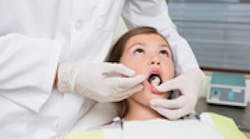AAPD pediatric oral health research and policy center issues Medicaid audit technical brief
The American Academy of Pediatric Dentistry (AAPD), one of the leading authorities on children’s oral health, released a technical brief titled “Unique Considerations for Medicaid Audits of Pediatric Dental Practices.”
The report supports efforts to eliminate abuse in the Medicaid program. However, it notes that unfair auditing practices will discourage pediatric dentists from providing care through Medicaid, which will have a substantial negative impact on children’s access to oral health care.
Dr. Casamassimo states, “Think zebras, not horses, about Medicaid audits of pediatric dental practices. Specialists in children’s dentistry treat Medicaid patients who are younger, at higher risk for dental disease, and require more complex treatment. The standard approach used in Medicaid audits simply doesn’t fit. As a result, pediatric dentists providing necessary treatment to large numbers of at-risk patients are caught unfairly in the net of supposed Medicaid overuse.”
Three characteristics are crucial to the effectiveness of Medicaid audits in pediatric dentistry, according to the brief. First, patient demographics show a higher risk of severe dental disease in children covered by Medicaid. Second, pediatric dental practices provide more complex care to younger children than do other dentists. Third, children seen by pediatric dentists are more likely to require dental treatment in a hospital or ambulatory setting and have a special health care need.
The recommendations contain consistent, objective audit methods grounded in sound clinical practice, such as the methodology used by the U.S. Department of Health and Human Services Office of the Inspector General including:
- Report cards issued to dentists regarding their services compared to other dental providers;
- Analyses of the number and type of local dentists; and
- Comparisons between the proportion of children who receive diagnostic and preventive services and the proportion of children who receive comprehensive and hospital-based care.
To read the technical brief click here. The brief provides additional information on the impact of Medicaid audits on access to dental care for children, as well as current “real life” stories of pediatric dental audits in Nebraska, Connecticut, and Maine.






